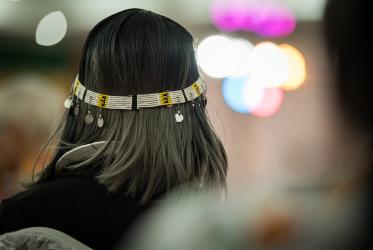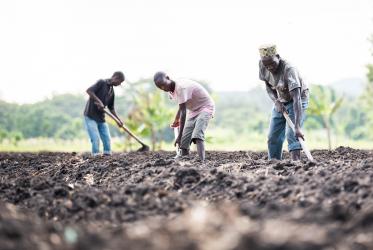As the 21st Conference of Parties (COP 21) of the United Nations Framework Convention on Climate Change came to a close in Paris, a consultation organized by the National Council of Churches in the Philippines (NCCP) and the Ecumenical Advocacy Alliance of the World Council Churches (WCC) on 11 December in Quezon City, Philippines considered “The Right to Food and Life in the Context of Climate Change.”
The consultation offered a forum for communities in the frontline of climate change impacts. “They should be our starting point,” said Sister Patricia Fox of the Rural Missionaries of the Philippines.
Zenaida Soriano of the National Federation of Peasant Women narrated how women farmers have to take out loans from village lenders before every planting season to purchase farming inputs. But the unpredictable weather wrought by climate change often causes harvests to fail, leaving many farmers deep in debt. “Some women land in jail; others are forced to migrate to the cities to work as domestic helpers,” she said. “Worse, still, a few resort to providing sexual favors out of desperation.”
“For Indigenous Peoples, the forests and mountains are our homes, shelters, pharmacies, markets or sources of food,” said Kerlan Fanagel, a member of B’laan tribe, and chair of the Pasaka Confederation of Lumad Organizations. But climate change coupled with deforestation due to logging and large-scale mining in the Southern Philippine island of Mindanao is beginning to change all that. “B’laan elders had never experienced a major typhoon in their lifetime” until Typhoon Bopha (known locally as Pablo), a category 5 storm, left villages in utter ruin in Davao Oriental and Compostela Valley in 2012.
“Leyte, Samar and Panay were already among the country’s most destitute provinces, with nearly half of the population living below the poverty line,” said Efleda Bautista of People Surge, a Typhoon Haiyan survivors’ group. Then a record-breaking storm swept away thousands of lives, flimsy homes and the precarious livelihoods of coconut farmers and fisher folk in 2013. “When morning broke and I went to survey the destruction, it was like Nagasaki, Hiroshima,” she recounted. “Fallen coconut trees and houses littered the fields like so many toothpicks.”
“The challenges of rebuilding post-Haiyan continue to be enormous,” shared Edward Santos of NCCP-ACT Alliance Philippines. “Community-driven disaster risk reduction and management ought to be an important part of adaptation,” he pointed out.
As climate change impinges on the right to food and life of communities who contribute least to it, “people in poverty, farmers and Indigenous Peoples are owed a tremendous climate debt,” said Athena Peralta, WCC consultant for economic and ecological justice, who represented the WCC at the gathering.
Drawing more than 70 participants, the consultation produced a statement calling upon world leaders “to implement a comprehensive, legally-binding and equitable global climate agreement that contains…commitments to reduce…greenhouse gas emissions…to keep global warming to 1.5C above pre-industrial levels…and the provision of climate finance as a primary responsibility of developed nations and transnational corporations that have historically contributed to climate change.” While the Paris climate agreement finalized over the weekend is overall legally-binding, country pledges to curb emissions and financial commitments are not.
Beyond COP 21 in Paris, “the struggle is back at home” said Leon Dulce of Kalikasan, a national environmental organization. “We have to hold our government accountable,” said Norma Dollaga, representing Stewards of Creation. The statement addresses several calls to the Philippine government including the need to “implement a…redistribution of land, the source of food for life,” “halt rampant land grabbing as well as conversion of agricultural lands into plantations,” and “invest in building climate resilience in the agriculture and fisheries sector by providing financial and other forms of assistance especially to small-scale farmers and fisher folk and by supporting community-based, low-carbon agricultural initiatives.”
The statement also underscored the role of churches who ought to “proclaim climate justice by critiquing the neo-liberal economic policies that accelerate climate change; advocating for the recognition and compensation of climate debts; lifting up the voices and accompanying the struggles of those most impacted by a warming climate…and offering a ministry of service to meet the needs of climate change victims.”
Father Rex Reyes, general secretary of the NCCP and an Indigenous Person, closed the consultation with the reminder that even as they carry the brunt of climate change, “it is the farmers and Indigenous Peoples who feed us and remind us of a different way to produce our food and live with respect for the land.” He added, “we must learn from them.”
NCCP statement "CLIMATE JUSTICE NOW! Beyond COP 21: Struggle for Right to Food, Land and Life" (15 December 2015)
WCC Statement on Eco-justice and Ecological Debt (September 2009)
Paris climate agreement hailed by ecumenical leaders (WCC press release of 14 December 2015)
COP21: how climate change affects access to our daily bread (WCC press release of 9 December 2015)
Philippines consultation to address human rights in context of climate change (WCC press release of 7 December 2015)
“Leave no one behind”: COP21 must tackle climate risks of the poorest and most vulnerable (WCC press release of 7 December 2015)







